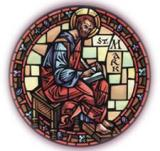|
|||
|---|---|---|---|
| This weekly bulletin insert complements the curriculum published by the Department of Christian Education of the Orthodox Church in America. This and many other Christian Education resources are available at http://dce.oca.org. | |||

The Gospel writer Mark was affectionately called "my son Mark" by the apostle Peter in Peter's first letter to the churches of Asia. Mark served Peter as a secretary, and was his trusted companion and spiritual son for many years. We also hear of Mark, sometimes called John Mark, in other places in the New Testament. Acts 12: 12 tells us that the Jerusalem Christians met in his mother Mary's house, and in Colossians 4:10 we read that he was a cousin of Barnabas. Mark accompanied Paul and Barnabas on their first missionary journey (Acts 12: 25). This familial beginning, though, apparently didn't work out well; Mark left the others early and returned to Jerusalem. When Barnabas proposed taking Mark on the second journey, Paul replied that he thought it best "not to take with them one who had withdrawn from them in Pamphylia and had not gone with them to the work" (Acts 15:38.) There was an argument, and Paul set out for Syria with Silas while Barnabas and Mark sailed to Cyprus. Later, when Paul was imprisoned and nearing his martyrdom in Rome, he and Mark were once again on good terms. Paul writes forlornly to Timothy that Demas has deserted him and others have left; only Luke is still with him. He instructs Timothy to "get Mark and bring him with you, for he useful to me for ministry" (II Timothy 4: 11.) Mark was as useful to others as he was to Paul. The Christians of Rome asked him to put in writing the record of the Lord's life and miracles, with Peter's recollections, and he did so. The Gospel he produced has the special quality of having been closely overseen and attested to by Peter himself. Mark's writing has a unique character. It presents Jesus as almost constantly active, recording fewer of His words than the other three Gospels, while giving a sense of urgency. The word "immediately" is used about forty times in its sixteen chapters. There is an emphasis on Jesus' sacrifice for the sake of others. In 8:31 He tells the disciples that the "Son of Man must undergo great suffering and be rejected...and be killed, and after three days rise again."
Small details, unique to Mark, make his story vivid. He writes that Jesus was "asleep on the cushion" in the storm-tossed boat from which He calms the sea, and that He "sighs" as He heals a deaf man. Mark gives us Aramaic words spoken by the Lord: "Ephphatha" as he heals the man, and "Talitha, cumi" when He raises Jairus' daughter. Peter eventually sent Mark to preach in Egypt, and he became the first Egyptian bishop, founding the church in Alexandria. He did great work there, and though he died a painful martyr's death at the hands of jealous pagans, he continues to help us. His relics have the healing power of a true saint and servant of God. |
|||
